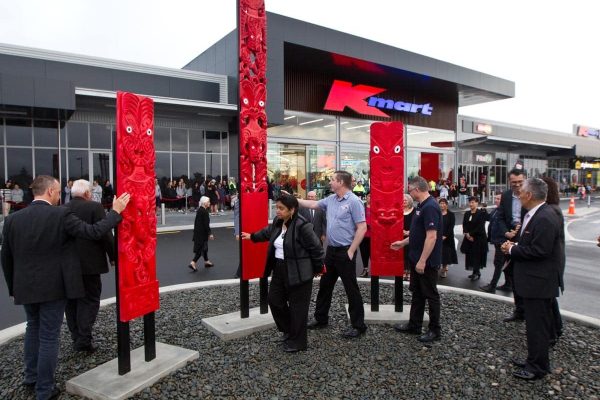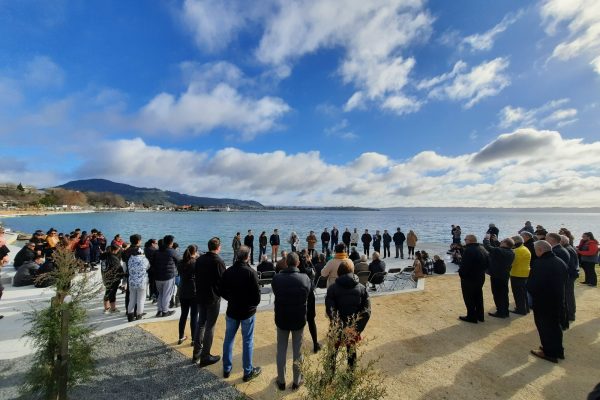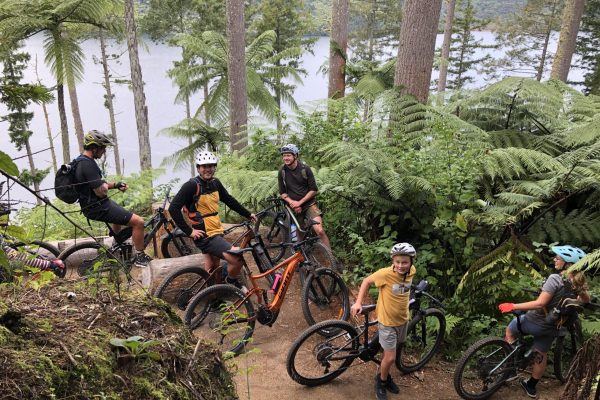Under Pressure: Long-Term Plan Season
Exploring the challenges facing New…
We spoke to Paul Spurdle about what Veros has achieved in Rotorua over the last ten years. Paul reflects back on the very first project that Veros worked on there, the diverse projects we are currently part of, and the team’s role in the transformation of the city. As his hometown, Paul is a firm believer that Rotorua offers the best of New Zealand, sharing why he loves the city and the best places to visit.
Q: What’s your role at Veros?
Paul: My title is Senior Development Manager and Property Advisor but I get to wear a lot of hats in my role. I lead or am part of a wider Veros team leading all kinds of projects across all sectors and project types. It’s this diverse and challenging work which I love most about Veros. In my work I get to travel all around New Zealand’s regions but I mainly work from our Rotorua office. As my hometown, I feel particularly privileged to be delivering projects that have an positive impact on Rotorua’s future, exploring new possibilities in property, and working with others to explore their ideas and make things real.
Q: Why did Veros start working in Rotorua?
Paul: Veros started working in Rotorua long before I joined the team, but our first project here was with Pukeroa Oruawhata, a commercial entity for Rotorua iwi Ngāti Whakaue developing the old Telecom site into what is now Trade Central. Our work involved testing the commercial feasibility of various ideas, master planning for the blank canvas site, and supporting the build process in stages over six years. In reflection, it’s amazing to think that our team helped turn what was once an underutilised piece of land into what is now a key regional retail centre and a high-performing asset for the client. The businesses on the site employ hundreds of local people and provide retail offerings with goods and services locally that were previously not available. As a result of this project, we built a strong, trusted relationship with Pukeroa and we slotted into their extended team as their development management experts and trusted advisors. Pukeroa remains an important client of ours and we are proud to continue working with them eight years on. We value this type of relationship where we can take a partnership approach with our clients, and support their long-term vision, intergenerational views, and together deliver projects that we can all take pride in.
Our other work with Pukeroa includes transforming the old Rotorua RSA into a prime office building names Haupapa House (where our office is located), helping the delivery of CARE Village in Ngongotaha, and of course, we are now project managers for Wai Ariki Spa on the lakefront which is a significant project for both Pukeroa and Rotorua. A number of these projects have gone on to be award-winning, and we are proud of our role in delivering them.

Q: What do you think are highlights of what Veros has achieved in Rotorua?
Paul: Looking at the big picture, with our work in Rotorua we have achieved great results for the city and with positive outcomes for the community. Over the last ten years we have been involved in some of Rotorua’s most transformative projects, but our involvement across the greater Rotorua Lakefront and city centre regeneration area has to be the highlight.
The Rotorua Lakes Council lakefront upgrade, the Wai Ariki Spa, the new QE Health and Wellness Centre, these abutting projects equate to well over $125 million of investment in an area of Rotorua which has not been utilised to its full potential. Compared to other major town centre regeneration projects across New Zealand, such as Wynyard Quarter or the Christchurch city centre rebuild, these projects have flown below the radar, but their impact on Rotorua cannot be understated. Our team is excited to be a part of these projects, which provide great amenities and strengthen this city as a fantastic destination for locals and visitors alike. These are massive projects for Rotorua and they all provide a platform for further investment and positive change around the lakefront area and the northern inner city.

Q: What else is the Veros Rotorua Team working on now?
Paul: There are plenty of great projects in Rotorua keeping the team busy, a lot of people in Rotorua think we are just project managers and most people would be surprised at the type and volume of work we are involved in here. Across the spectrum, we are currently working on the Fordland’s Community Centre, a community organisation that has such a fantastic vision with super passionate people behind it. We have been working on the feasibility of building a new multi-purpose community centre as well as some much-needed housing in the surrounding area.
I am currently working on a Stormwater Management Plan (SMP) for a major greenfield growth area in the southwest of Rotorua, the Pukehangi residential development area. This is a crucial project for Rotorua as it has the potential to deliver over 600 houses on land which is truly outstanding, and with the potential to enhance Rotorua as a place to live by providing a range of new housing types and choices. In undertaking the SMP, we have taken an innovative approach and have partnered with mana whenua to co-design the management plan. We’ve also collaborated with landowners and focused on ensuring that we are setting up that area not only to deliver what will be Rotorua’s most sought-after residential area but one which will take on water sensitive design and improve our environment. These types of approaches are critical and refreshing for everyone involved in these types of projects, where the same rinse-and-repeat approach that has been used for the past decade no longer cuts it.
We’ve also worked on several projects with Rotorua Lakes Council (RLC) and Rotorua Economic Development (RED), another strong relationship we have built over several years. Our Project Management team is currently wrapping the work at the Lakefront, an outstanding project of which we are all proud to have been a part. The Aquatic Centre Redevelopment is also now underway which will be another great community asset. And it isn’t just our Project Management team that works with RLC, our advisory and development management have been involved in several different council projects over recent years. With our team’s experience delivering all types of housing and development across New Zealand, we are able to provide pragmatic advice and expertise to Council on what levers they can (and can’t pull) to influence various outcomes. They are in a tough position at the moment like many other councils and a lot of the solutions take time.

Q: Rotorua is experiencing mixed media relating to motels and homelessness at the moment, what is your outlook for Rotorua in the next 10 years?
Paul: Yes, there certainly are some challenges facing the city at the moment. Some of these issues are also being faced by cities in other parts of New Zealand, but others are unique to Rotorua. Rotorua has copped a branding hammering with social issues arising from Covid and the management of housing since that time. Unfortunately now as our borders open and we look to kickstart our tourism economy, which is so critical to Rotorua, these problems are holding us back.
I’ve used this analogy a lot when talking about the current state and future of Rotorua recently, and it’s that there are two sides of the coin. The wider community and public can generally only see one side of the coin which is why some people have a gloomy outlook on Rotorua and where it is heading. This side of the coin captures the problems of Fenton Street, housing affordability pressures, and struggling businesses and the visitor sector due to covid. The other side of the coin it’s always visible to the general public and on this side there is actually heaps of positive outcomes for the city. An example of this would be that we have several large landowners and investors in the process of designing and consenting their land for development. This includes both residential and industrial developments and both are crucial to support good growth. There are investors from out of town coming here, establishing, buying property, and developing it which is not something that has generally occurred in Rotorua previously. There is investment confidence, but in the property sector, it can take months and years before the public reaps the benefits of this or sees what has been happening on the other side of the coin which isn’t so visible. But despite all of this, Rotorua is fundamentally an exceptional part of our country. This is both the people, who are welcoming, caring and friendly, as well as the outstanding environment and activities we have both in Rotorua and the wider district.

Q: Why do you live in Rotorua?
Paul: Well, that’s easy, it’s the best place in New Zealand! Where else do you have beautiful lakes, one of the world’s best all-year-round mountain biking parks on your doorstep, and be also within a three-hour drive to snowy mountains, beaches, a major global city, and everything in between. At the core of it, the people and the community are the reason I call Rotorua home. We may not be the most perfect community but it’s real and authentic. It’s got a real soul which I find some other parts of New Zealand lack. It’s also where I grew up and where my Mum and Dad grew up, it’s home for me and I love getting up every day and having a real influence working on some awesome projects that are genuinely shaping Rotorua’s future.
Q: What is your typical day in Rotorua?
Paul: I’m usually trying to get up and out of bed early with the mantra that if you ‘win the morning, you win the day’. I’ll always head out and grab a coffee on my way to work from either Zippys, Boasters, or the Junction, which has just opened at the old Post Office. Then I’m generally in meetings, on-site, or travelling out of town working on projects all over regional New Zealand. No day is the same which is great.
Q: What’s the best thing to do on a visit to Rotorua, any hidden spots to share?
Paul: In terms of the best thing to do…this a tough one as there is genuinely so much to do. Every year we have a team strategy day and although we have offices in Rotorua, Hamilton, and Tauranga and work across all of New Zealand, we almost always end up spending those days as a team in Rotorua. Go-karting, boating, mountain biking, white water rafting, luging, there is so much to do. We have been holding these strategy days for years in Rotorua and are yet to do the same activity twice.
If I had to pick a top hidden spot it would be the Whakarewarewa Forest (the Redwoods). I know it’s not really that much of a secret, but it definitely still flies under the radar. There are lots of locals that still don’t utilise it and many who haven’t visited it yet. I personally believe the place has the power to help solve all your problems and forge lifelong friendships with those who regularly enjoy it together. It has been a big factor in supporting the Rotorua economy during the Covid period and has reached a point where it’s of a scale where it will now go from strength to strength as more people use it and more investment is made. People need to start thinking of it like having a world-class ski field on the doorstep of the City because that’s pretty much the impact it has. It’s an invaluable asset for the city, not only does it attract visitors all year round, but people are genuinely moving to the area for the sole reason of being closer to the forest. It also has the Secret Spot (or not-so-secret spot) on its doorstep, so after a ride, you can partake in a couple of well-deserved beverages!
Featured News Articles
Exploring the challenges facing New…
Join us in celebrating Mike…
Last week our team joined…
At the end of last…
Last week, our team embarked…
Last night we celebrated the…
For the past decade, Veros…
For the past decade Michelle…
Having worked on huge developments…
Hailing from the Waimea Plains…
The Veros Project Management team…
We are extremely pleased to…